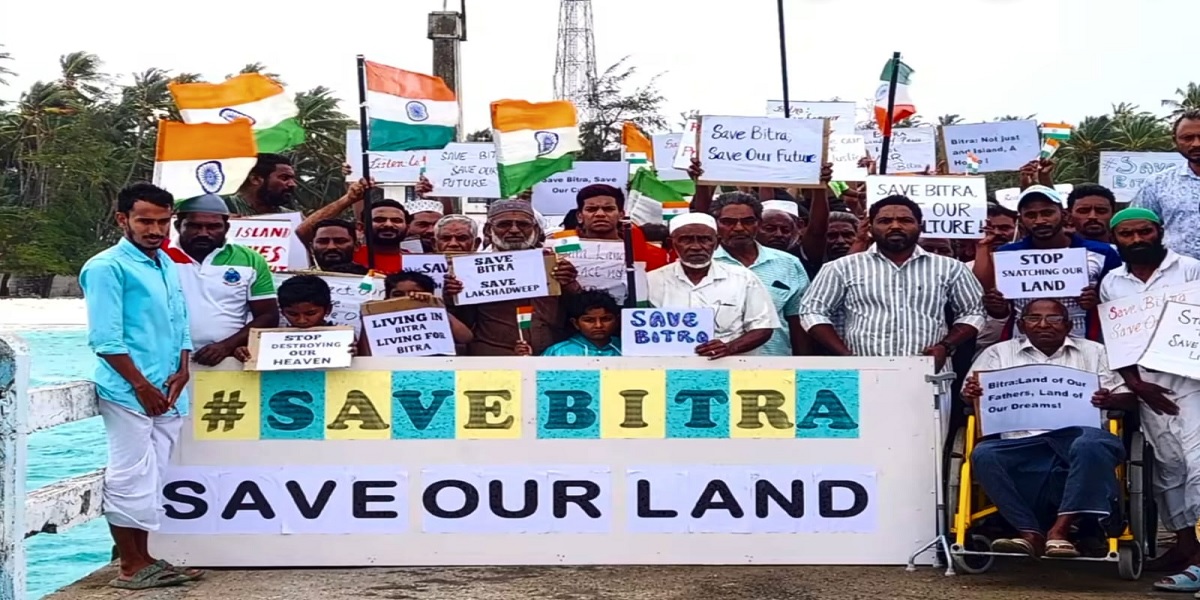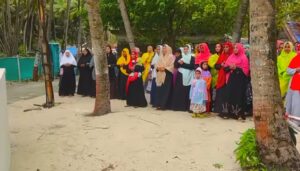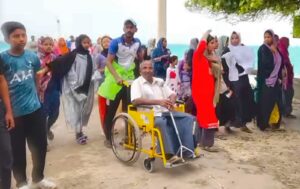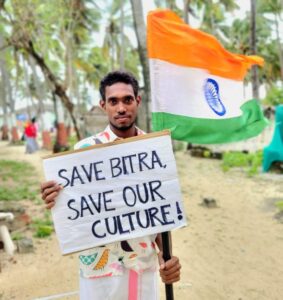Official version is that Bitra plays a crucial role in securing major sea routes that transport vital resources like fuel and food, and acts as a buffer against expanding Chinese activities in the Arabian Sea and Indian Ocean.
Published Jul 26, 2025 | 9:00 AM ⚊ Updated Jul 26, 2025 | 9:00 AM

For the people of Bitra, this is not just about land, it is about legacy, identity, and survival.
Synopsis: The Lakshadweep Administration issued a final notification for the acquisition of the entire Bitra Island. The final declaration and order, dated 11.7.25, published in The Lakshadweep Gazette Extraordinary, was officially signed by Shivam Chandra, IAS, Collector (Land Acquisition). No resident was consulted before the notification was issued.
Birds left Bitra, a coral atoll belonging to the Amindivi sub-group of the Lakshadweep archipelago. Human interference made the pelagic birds leave the speck of land in the Arabian Sea.
Now, the residents — fewer than 300 — of Bitra fear they, too, would be forced to leave the land where they have been living for generations. The Lakshadweep administration is planning to take over the entire island for defence purposes, citing national security and strategic importance.
”We do not know why we are being punished like this. We do not know where we will go, or why we are always made the victims. Why are we not treated as human beings?” asked Ahmed Master in a shaky, crackling voice.
Born in 1957 on Bitra Island, Ahmed Master is among the last of a generation rooted deep in this remote, fragile strip of land in the Lakshadweep archipelago. He grew up watching his father and grandfather live in harmony with the sea, soil, and sky, a way of life passed down for centuries.
Today, that life is on the brink of extinction.
For the residents of Bitra, the Lakshadweep administration’s decision came without warning, consent, or even consultation. For them, it is not just about land, it is about legacy, identity, and survival. Their ancestors are buried here. Their children were born here. This is their home, their heritage, not a strategic asset to be erased.
At 68, Ahmed Master, once a fierce voice of his people, struggles to sleep. The fear of forced displacement hangs heavy, and the silence of the authorities only deepens the despair.
The entire issue began when the Union Territory Administration of Lakshadweep issued a final notification for the acquisition of the entire Bitra Island. The final declaration and order, dated 11.7.25 published in The Lakshadweep Gazette Extraordinary, was officially signed by Shivam Chandra, IAS, Collector (Land Acquisition).

People of Bitra offering prayers as part of the protest.
The notification was quietly published in The Lakshadweep Gazette Extraordinary, with no mention of public consultation or consent from the island’s residents.
The order said the land is being acquired under the Right to Fair Compensation and Transparency in Land Acquisition, Rehabilitation and Resettlement Act, 2013, invoking Section 19(1).
But ironically, the very Act that promises transparency and fairness is being bypassed. The Administration has exempted the acquisition from a Social Impact Assessment (SIA), using Section 10A of the Act—a provision originally meant for emergency and critical infrastructure like railways and natural disasters.
Bitra is not just 10.5 hectares of land. It is the only inhabited island in the northernmost part of Lakshadweep, home to a small indigenous community whose culture, language, and life are rooted in this land.
According to the order-
The islanders have not been consulted, and there is no clarity on where they will be rehabilitated or how they will be compensated—not just financially, but emotionally and culturally.
While the order claims that compensation and resettlement will be done ”as per law” there is no transparent plan. Moreover, the government has ignored the lived reality of the people, reducing their ancestral home to just ”private land.”
”How can an entire island, homes, mosque, fishing boats, burial grounds, be taken over without asking a single resident? We are not trespassers. We are Bitra.” Ahmed Master said South First.
When South First contacted Yaseen, an employee at the Bitra lighthouse, he spoke not just as an individual, but as a representative of generations who have called the island home.

A peaceful protest held at Bitra.
”My ancestors have lived on this island for generations. My father was a police officer, and my mother is from Chetlat, the closest island to Bitra. We lived in Chetlat too, but after I got married in Bitra, I had the chance to return to my ancestral land,” Yaseen said.
”For the past 22 years, I’ve lived permanently in Bitra. Our ancestral home, the ”Padippura House” is well known here. We didn’t come here yesterday. This land is not just our address, it is our identity,” he said.
Yaseen, his father Hameed PP, grandfather Khader, and Yaseen’s three children, were all born and raised on this island.
The 2011 Census recorded Bitra’s population at 271, making it the least populated inhabited island in Lakshadweep. But Yaseen estimates that more than 400 people now live there, across nearly 160 homes.
Some of their land has already been lost to the sea due to coastal erosion. Yet, the people of Bitra continued to live with dignity, unaware that a far bigger threat was quietly unfolding.
Yaseen said he and the other residents only learned about the administration’s order to acquire the entire island many days after it had been published in the Union Territory Administration’s headquarters in Kavaratti.
”No one spoke to us before this decision. There was no meeting, no consultation — nothing,” he said.
According to Yaseen, the Indian Navy has already constructed a building on the island, reportedly worth ₹18 crore, with only the tiling work remaining.
”As per the notification, they could begin operations within two months. But what about us? There’s no clarity on where we will go, or where we are expected to live,” he added.
”We don’t have tall buildings or traffic or pollution here. After the 8th standard, our children go to Chetlat for higher education. We’ve always lived a peaceful life,” he said.
”We truly believed the new building was part of a national security project. Not even in our worst dreams did we think our entire island would be taken for defence purposes, and that we would be left homeless. I don’t know why we are punished like this. Is it a crime to love your land and live where your ancestors did?” Yaseen’s voice cracked with grief.
When South First asked the administration about the rationale behind decisions that have deeply unsettled an entire community, an official, speaking on condition of anonymity, hinted at strategic concerns.
According to the officer, Bitra, though small and seemingly insignificant, holds immense geopolitical value due to its location.
Its position enhances India’s maritime monitoring abilities, plays a crucial role in securing major sea routes that transport vital resources like fuel and food, and acts as a buffer against expanding Chinese activities in the Arabian Sea and Indian Ocean, including ports, naval installations, and so-called research facilities.
The island, he implied, is part of a quiet but critical frontline in India’s maritime security.
On the remote island of Bitra lies a modest shrine, a resting place of an old Arab saint named Malik Mulla. For generations, the people of Bitra have shared their joys, sorrows, fears, and dreams with this sacred soul.

Sabith, holding a placard, joined the Save Bitra protest.
He is not just a memory but a silent witness to their lives, their protector, their guide.
Now, as the entire Lakshadweep archipelago rises in protest and campaigns to save Bitra from being completely taken over for defence use. But the people of Bitra are standing in front of Malik Mulla’s shrine, praying, not just for their land, but for the right to remain where their ancestors once stood, lived, and died.
When South First reached out to Congress worker Sabith and Activist Saleem Chishti from nearby islands, they spoke about a painful truth,
”The people of Bitra are too innocent, too rooted in faith and simplicity, even to protest for their rights. So we will raise our voices for them.”
Ahmed Master added, ”We have always loved our country. We have coexisted peacefully with the defence forces, the administration, and security personnel for decades. We have always cooperated. But since Praful Khoda Patel took over as administrator, life here has become a daily struggle for dignity and survival.”
Today, the people of Bitra are in an uncertain situation, trying to prove their patriotism, not through words, but through silent devotion.
One hand holds the Indian flag, the other folds in prayer before Malik Mulla. Both matters. Both are sacred.
This is Bitra, a land where loyalty meets faith, where people don’t shout, they plead. And like Sabith said, ”No country is secure when its people are homeless. Save Bitra first, then guard the borders.”
That’s not just a demand. It’s the bare minimum for people who ask for nothing more than the right to stay home.
(Edited by Majnu Babu).
